 W
WAustromarxism was a Marxist theoretical current, led by Victor Adler, Otto Bauer, Karl Renner, Max Adler and Rudolf Hilferding, members of the Social Democratic Workers' Party of Austria in Austria-Hungary and the First Austrian Republic, and later supported by Austrian-born revolutionary and assassin of the former Imperial Prime Minister Count von Stürgkh, Friedrich Adler. It is known for its theory of nationality and nationalism, and its attempt to conciliate it with socialism in the imperial context. More generally, the Austromarxists strove to achieve a synthesis between social democracy and revolutionary socialism. Uniquely, Austromarxists posited that class consciousness in the working class could be achieved more organically through the maintenance of national autonomy, in contrast to the internationalist perspective and the notion of the party vanguard popular in orthodox Marxist circles elsewhere in Europe.
 W
WBoosterism is the act of promoting ("boosting") a town, city, or organization, with the goal of improving public perception of it. Boosting can be as simple as talking up the entity at a party or as elaborate as establishing a visitors' bureau. It has been somewhat associated with American small towns.
 W
WCollective action refers to action taken together by a group of people whose goal is to enhance their condition and achieve a common objective. It is a term that has formulations and theories in many areas of the social sciences including psychology, sociology, anthropology, political science and economics.
 W
W"Communazi" is an American political neologism, "coined by a reporter" and made popular by Time days after the Molotov–Ribbentrop Pact. It implied that both Communism and Nazism were one and the same because they were essentially totalitarian, whether left or right in belief. It continues to receive mention, largely in its historial context, to the present.
 W
WConstitutional patriotism is the idea that people should form a political attachment to the norms and values of a pluralistic liberal democratic constitution rather than a national culture or cosmopolitan society. It is associated with post-nationalist identity, because it is seen as a similar concept to nationalism, but as an attachment-based on values of the constitution rather than a national culture. In essence, it is an attempt to re-conceptualize group identity with a focus on the interpretation of citizenship as a loyalty that goes beyond individuals' ethnocultural identification. Theorists believe this to be more defensible than other forms of shared commitment in a diverse modern state with multiple languages and group identities. It is particularly relevant in post-national democratic states in which multiple cultural and ethnic groups coexist. It was influential in the development of the European Union and a key to Europeanism as a basis for multiple countries belonging to a supranational union.
 W
WCounterintelligence state is a state where the state security service penetrates and permeates all societal institutions, including the military. The term has been applied by historians and political commentators to the former Soviet Union, the former German Democratic Republic, Cuba after the 1959 revolution, Iraq under Saddam Hussein, China, and post-Soviet Russia under Vladimir Putin, especially since 2012.
 W
WCraftivism is a form of activism, typically incorporating elements of anti-capitalism, environmentalism, solidarity, or third-wave feminism, that is centered on practices of craft - or what has traditionally be referred to as "domestic arts". Craftivism includes, but is not limited to, various forms of needlework including yarn-bombing or cross-stitch. Craftivism is a social process of collective empowerment, action, expression and negotiation. In craftivism, engaging in the social and critical discourse around the work is central to its production and dissemination. Practitioners are known as craftivists. The word 'craftivism' is a portmanteau of the words craft and activism.
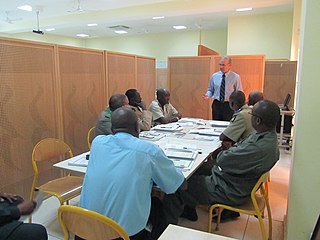 W
WDemocracy promotion, which can also be referred to as democracy assistance, democracy support, or democracy building, is a strand of foreign policy adopted by governments and international organizations that seek to support the spread of democracy as a political system around the world. Among the reasons for supporting democracy include the belief that countries with a democratic system of governance are less likely to go to war, are likely to be economically better off and socially more harmonious. In democracy building, the process includes the building and strengthening of democracy, in particular the consolidation of democratic institutions, including courts of law, police forces, and constitutions. Some critics have argued that the United States has used democracy promotion to justify military intervention abroad.
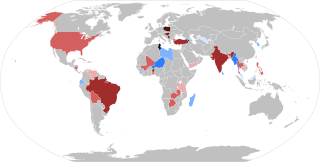 W
WDemocratic backsliding, also known as autocratization and de-democratization, is a gradual decline in the quality of democracy and the opposite of democratization. If unchecked, democratic backsliding results in the state losing its democratic qualities, becoming an autocracy or authoritarian regime. Democratic decline is caused by the state-led weakening of political institutions that sustain the democratic system, such as the peaceful transition of power or free and fair elections. Although these political elements are assumed to lead to the onset of backsliding, other essential components of democracy such as infringement of individual rights, especially freedom of expression, question the health, efficiency and sustainability of democratic systems over time.
 W
WIn political and sociological theory, the elite are a small group of powerful people who hold a disproportionate amount of wealth, privilege, political power, or skill in a society. Defined by the Cambridge Dictionary, the "elite" are "those people or organizations that are considered the best or most powerful compared to others of a similar type."
 W
WElite overproduction is a concept developed by Peter Turchin, which describes the condition of a society which is producing too many potential elite-members relative to its ability to absorb them into the power structure. This, he hypothesizes, is a cause for social instability, as those left out of power feel aggrieved by their relatively low socioeconomic status.
 W
WEmbedded liberalism is a term for the global economic system and the associated international political orientation as they existed from the end of World War II to the 1970s. The system was set up to support a combination of free trade with the freedom for states to enhance their provision of welfare and to regulate their economies to reduce unemployment. The term was first used by the American political scientist John Ruggie in 1982.
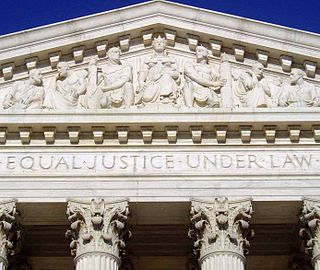 W
WEqual justice under law is a phrase engraved on the West Pediment, above the front entrance of the United States Supreme Court building in Washington D.C. It is also a societal ideal that has influenced the American legal system.
 W
WEquality before the law, also known as equality under the law, equality in the eyes of the law, legal equality, or legal egalitarianism, is the principle that all people must be equally protected by the law. The principle requires a systematic rule of law that observes due process to provide equal justice, and requires equal protection ensuring that no individual nor group of individuals be privileged over others by the law. Sometimes called the principle of isonomy, it arises from various philosophical questions concerning equality, fairness and justice. Equality before the law is one of the basic principles of some definitions of liberalism. It is incompatible with legal slavery.
 W
WEquality of sacrifice is a term used in political theory and political philosophy to refer to the perceived fairness of a coercive policy.
 W
WFascism is a form of far-right, authoritarian ultranationalism characterized by dictatorial power, forcible suppression of opposition, and strong regimentation of society and of the economy, which came to prominence in early 20th-century Europe. The first fascist movements emerged in Italy during World War I, before spreading to other European countries. Opposed to anarchism, democracy, liberalism, and Marxism, fascism is placed on the far right-wing within the traditional left–right spectrum.
 W
WFree-market anarchism, or market anarchism, also known as free-market anti-capitalism and free-market socialism, is the branch of anarchism that advocates a free-market economic system based on voluntary interactions without the involvement of the state. A form of individualist anarchism, left-libertarianism and market socialism, it is based on the economic theories of mutualism and individualist anarchism in the United States. Left-wing market anarchism is a modern branch of free-market anarchism that is based on a revival of such free-market anarchist theories. It is associated with left-libertarians such as Kevin Carson and Gary Chartier, who consider themselves anti-capitalists and socialists.
 W
WFull spectrum diplomacy is a combination of traditional, government-to-government diplomacy with the many components of public diplomacy as well as the integration of these two functions with other instruments of statecraft. The term was coined by Dr. John Lenczowski, the founder and president of the Institute of World Politics in Washington, D.C. in his book Full Spectrum Diplomacy and Grand Strategy: Reforming the Structure and Culture of U.S. Foreign Policy which was released in May, 2011.
 W
WA great power is a sovereign state that is recognized, as having the ability and expertise to exert its influence on a global scale. Great powers characteristically possess military and economic strength, as well as diplomatic and soft power influence, which may cause middle or small powers to consider the great powers' opinions before taking actions of their own. International relations theorists have posited that great power status can be characterized into power capabilities, spatial aspects, and status dimensions.
 W
WIn political science and popular discourse, the horseshoe theory asserts that the far-left and the far-right, rather than being at opposite and opposing ends of a linear political continuum, closely resemble one another, analogous to the way that the opposite ends of a horseshoe are close together. The theory is attributed to French philosopher and writer Jean-Pierre Faye. Proponents of the theory point to a number of similarities between the far-left and the far-right, including their supposed propensity to gravitate to authoritarianism or totalitarianism. Several political scientists criticize the theory.
 W
WImpossibilism is a Marxist theory that stresses the limited value of political, economic, and social reforms under capitalism. As a doctrine, impossibilism views the pursuit of such reforms as counterproductive to the goal of achieving socialism as they stabilize, and therefore strengthen, support for capitalism. Impossibilism holds that reforms to capitalism are irrelevant or outright counter-productive to the goal of achieving socialism and should not be a major focus of socialist politics.
 W
WInstitutions, according to Samuel P. Huntington, are "stable, valued, recurring patterns of behavior". Institutions can refer to mechanisms which govern the behavior of a set of individuals within a given community, and are identified with a social purpose, transcending individuals and intentions by mediating the rules that govern living behavior. According to Geoffrey M. Hodgson, it is misleading to say that an institution is a form of behavior. Instead, Hodgson states that institutions are "integrated systems of rules that structure social interactions".
 W
WIntegral humanism was a set of concepts drafted by Deendayal Upadhyaya as a political program and adopted in 1965 as the official doctrine of the Jan Sangh and later BJP. Upadhyaya borrowed the Gandhian principles such as sarvodaya, swadeshi (domestic), and Gram Swaraj and these principles were appropriated selectively to give more importance to cultural-national values. These values were based on an individual's undisputed subservience to nation as a corporate entity. Richard Fox has characterised this as "ideological hijacking" and a "transplant" that was designed with a purpose to appropriate the authority that the Gandhian idioms had on Indian politics.
 W
WInvented traditions are cultural practices that are presented or perceived as traditional, arising from the people starting in the distant past, but which in fact are relatively recent and often even consciously invented by identifiable historical actors. The concept was highlighted in the 1983 book The Invention of Tradition, edited by Eric Hobsbawm and Terence Ranger. Hobsbawm's introduction argues that many "traditions" which "appear or claim to be old are often quite recent in origin and sometimes invented." This "invention" is distinguished from "starting" or "initiating" a tradition which does not then claim to be old. The phenomenon is particularly clear in the modern development of the nation and of nationalism, creating a national identity promoting national unity, and legitimising certain institutions or cultural practices.
 W
WLeadership is both a research area, and a practical skill encompassing the ability of an individual, group or organization to "lead", influence or guide other individuals, teams, or entire organizations. Often viewed as a contested term, specialist literature debates various viewpoints, contrasting Eastern and Western approaches to leadership, and also North American versus European approaches.
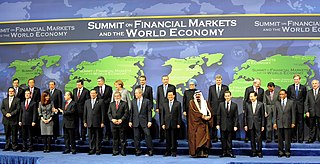 W
WIn international relations, a middle power is a sovereign state that is not a great power nor a superpower, but still has large or moderate influence and international recognition.
 W
WA nation state is a political unit where the state and nation are congruent. It is a more precise concept than "country", since a country does not need to have a predominant ethnic group.
 W
WA non-governmental organization, nongovernmental organization, non-government organization, or simply an NGO, is an organization that is, generally, formed independent from government. They are typically nonprofit entities, and many of them are active in humanitarianism or the social sciences; they can also include clubs and associations that provide services to their members and others. Surveys indicate that NGOs have a high degree of public trust, which can make them a useful proxy for the concerns of society and stakeholders. However, NGOs can also be lobby groups for corporations, such as the World Economic Forum.
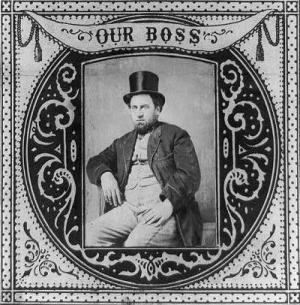 W
WIn politics, a boss is a person who controls a faction or local branch of a political party. They do not necessarily hold public office themselves; most historical bosses did not, at least during the times of their greatest influence. Numerous officeholders in that unit are subordinate to the single boss in party affairs. Bosses may base their power on the support of numerous voters, usually organized voting blocs, and manage a coalition of these blocs and various other stakeholders. When the party wins, they typically control appointments in their unit, and have a voice at the higher levels. Reformers typically allege that political bosses are corrupt. This corruption is usually tied to patronage; the exchange of jobs, lucrative contracts and other political favors for votes, campaign contributions and sometimes outright bribes.
 W
WProletarian internationalism, sometimes referred to as international socialism, is the perception of all communist revolutions as being part of a single global class struggle rather than separate localized events. It is based on the theory that capitalism is a world-system and therefore the working classes of all nations must act in concert if they are to replace it with communism.
 W
WA quasi-state or state-like entity, including what is termed a proto-state, is a political entity that does not represent a fully institutionalized or autonomous sovereign state.
 W
WIn international relations since the late 20th century, a regional power is a term used for a state that has power within a geographic region. States which wield unrivalled power and influence within a region of the world possess regional hegemony.
 W
WThe right to exist is said to be an attribute of nations. According to an essay by the nineteenth-century French philosopher Ernest Renan, a state has the right to exist when individuals are willing to sacrifice their own interests for the community it represents. Unlike self-determination, the right to exist is an attribute of states rather than of peoples. It is not a right recognized in international law. The phrase has featured prominently in the Arab–Israeli conflict since the 1950s.
 W
WSocial control is a concept within the disciplines of the social sciences. Social control is described as a certain set of rules and standards in society that keep individuals bound to conventional standards as well as to the use of formalized mechanisms. The disciplinary model was the forerunner to the control model.
 W
WA state is a polity under a system of governance with a monopoly on force. There is no undisputed definition of a state. A widely used definition from the German sociologist Max Weber is that a "state" is a polity that maintains a monopoly on the legitimate use of violence, although other definitions are not uncommon. A state is not synonymous with a government, as stateless governments like the Iroquois Confederacy exist.
 W
WState formation is the process of the development of a centralized government structure in a situation where one did not exist prior to its development. State formation has been a study of many disciplines of the social sciences for a number of years, so much so that Jonathan Haas writes that "One of the favorite pastimes of social scientists over the course of the past century has been to theorize about the evolution of the world's great civilizations." The study of state formation is divided generally into either the study of early states or the study of modern states. Academic debate about various theories is a prominent feature in fields like Anthropology, Sociology, Economics and Political Science. State formation can include state-building and nation-building.
 W
WA superpower is a state with a dominant position characterized by its extensive ability to exert influence or project power on a global scale. This is done through the combined means of economic, military, technological, political and cultural strength as well as diplomatic and soft power influence. Traditionally, superpowers are preeminent among the great powers.
 W
WSynoecism or synecism, also spelled synoikism, was originally the amalgamation of villages in Ancient Greece into poleis, or city-states. Etymologically the word means "dwelling together (syn) in the same house (oikos)." Subsequently, any act of civic union between polities of any size was described by the word synoikismos. The closest analogy today is the incorporation of a city; in fact, "incorporation" is often used to translate synoikismos, in addition to the Latinized synoecism. Synoecism is opposed to Greek dioecism, the creation of independent communities within the territory of a polis.
 W
WTo take point, walk point, be on point, or be a point man is to assume the first and most exposed position in a combat military formation, that is, the leading soldier or unit advancing through hostile or unsecured territory. The term can be applied to infantry or mechanized columns. The soldier, vehicle, or unit on point is frequently the first to take hostile fire. The inherent risks of taking point create a need for constant and extreme operational alertness. However, ambushes often intend to let the point element past the prime kill zone in order to be maximally effective. Point position is often rotated periodically so as not to overtax the individual soldier/unit.
 W
WTotalitarianism is a form of government and a political system that prohibits all opposition parties, outlaws individual opposition to the State and its claims, and exercises an extremely high degree of control and regulation over public and private life. It is regarded as the most extreme and complete form of authoritarianism. In totalitarian states, political power is often held by autocrats, such as dictators and absolute monarchs, who employ all-encompassing campaigns in which propaganda is broadcast by state-controlled mass media in order to control the citizenry. It remains a useful word but the old 1950s theory was considered to be outdated by the 1980s, and is defunct among scholars. The proposed concept gained prominent influence in Western anti-communist and McCarthyist political discourse during the Cold War era as a tool to convert pre-World War II anti-fascism into post-war anti-communism.
 W
WAn unsinkable aircraft carrier is a term sometimes used to refer to a geographical or political island that is used to extend the power projection of a military force. Because such an entity is capable of acting as an airbase and is a physical landmass not easily destroyed, it is, in effect, an immobile aircraft carrier that cannot be sunk.